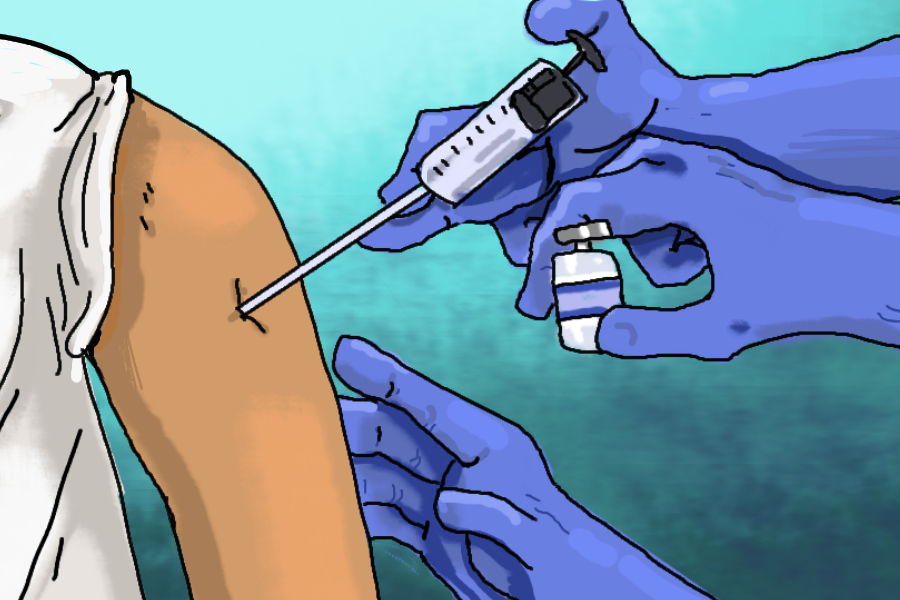You got the COVID-19 vaccine — now what? Chicago health experts answer questions on vaccine effectiveness, immunity
Daily File Illustration by Hank Yang
Chicago healthcare professionals talk next steps for vaccinations, COVID-19 variants and vaccine immunity responses.
April 29, 2021
As COVID-19 vaccine eligibility expands and a desire for a return to normalcy heightens, Chicago health experts warn against complacency and encourage continued vaccine rollout.
What should I do after getting vaccinated?
According to the U.S. Centers for Disease Control and Prevention, an individual is fully vaccinated after two weeks of receiving a second dose of the Moderna or Pfizer-BioNTech shots or a single dose of the Johnson & Johnson (Janssen) shot.
After reaching this status, the CDC says individuals can gather indoors without masks with other fully vaccinated individuals.
If a fully vaccinated individual is exposed to someone who tested positive for COVID-19, they do not need to get tested or self-quarantine unless they are showing symptoms. Exceptions apply if the individual lives in a group setting.
Despite these relaxed restrictions, fully vaccinated individuals should still adhere to public health guidelines given the uncertainty of the pandemic.
University of Illinois at Chicago physician Shikha Jain said because vaccines aren’t 100 percent effective, fully vaccinated individuals could asymptomatically spread the disease to unvaccinated people.
“We’re starting to see the numbers across the country stabilize, but what we need to make sure is that we keep mask(ing) and we keep social distancing until the numbers have dropped significantly,” Jain said. “Otherwise, we’re gonna end up in a very dangerous situation.”
What is the impact of COVID-19 variants on vaccine effectiveness?
While more research still needs to be done to see the full impact of vaccines in protecting against COVID-19 variants, current vaccines still offer protection, according to the CDC.
To achieve herd immunity and subdue the spread of these variants, Advocate Condell Medical Center Emergency Medicine Physician Halleh Akbarnia said 70 to 85 percent of the national population will need to be fully vaccinated, which may fluctuate based on how contagious the variants are.
However, Akbarnia said the problem right now lies with encouraging unvaccinated people to get the vaccine.
“I feel like all the people who are truly ambitious and wanting to get vaccinated have either done so or are in the process of doing it,” Akbarnia said. “In many communities there are rumors that are out there, and it’s important to bring information into communities, into local areas where people congregate.”
Infectious disease specialist Emily Landon said once the population reaches herd immunity, enough people will become immune to the disease so it can no longer effectively circulate through a community. This may take longer, though, in communities with anti-vaxxers.
Landon explained that the more people who get the coronavirus while waiting for a vaccine, the more likely it is that variants will spread.
“There are communities where there are more unvaccinated people so unvaccinated people tend to be in clumps,” Landon said. “Herd immunity is only as good as we can get it. Honestly, everybody needs to get a vaccine or be immune in some way.”
How does natural immunity differ from vaccine immunity?
Rush University Medical Center assistant professor Susan Lopez said people who’ve contracted COVID-19 produce antibodies as a result of their body fighting the disease and are protected for at least three months after infection.
However, Lopez said it’s hard to tell how long that natural immunity lasts. The vaccine has been shown to provide protection for at least six months after vaccination.
While it’s typically been the case that physically contracting a disease produces the strongest antibody response to prevent natural infection, Landon said mRNA vaccines seem to provide the strongest immunity to COVID-19. They give instructions that help the body produce the proteins ordinarily found on the virus causing COVID-19.
“There appears to be a benefit to being vaccinated, even if you already had COVID, and that is something that I would not have ever expected myself to say about a vaccine,” Landon said. “People have double checked this and triple checked it, and it appears to be that that’s the case.”
She said while vaccine rollout may appear quick, mRNA vaccine technology has been in development and in use for over 20 years, deeming it to be “clearly safe.”
While she said she’s unsure about the necessity for boosters or how long immunity will last following the current rollout, necessary corners were cut in order to provide vaccines to the community as soon as possible.
“If you want to know where the corners were cut, it was in figuring out how long the vaccines are going to last, and if that (immunity) we saw at the beginning… is going to persist,” Landon said. “That may not seem like much, but I don’t really like worsening odds when it comes to my health.”
Email: [email protected]
Twitter: @amittal27
Related stories:
— The Daily’s COVID-19 vaccination guide: what you need to know and how to get a COVID-19 vaccine
— Fully vaccinated? What you can do, according to CDC and University guidelines
— City partners with Northwestern to administer vaccines, continues vaccination events












